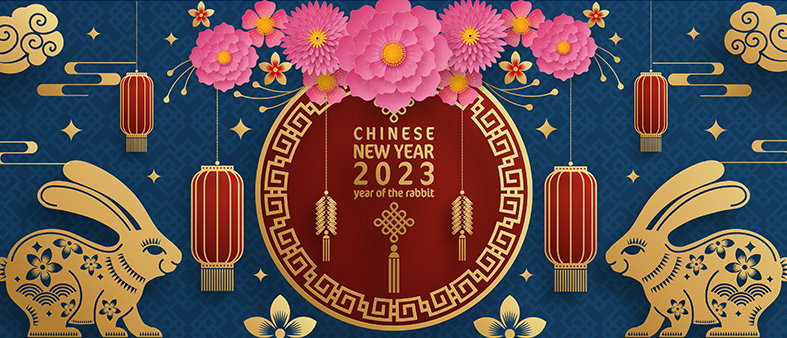
China’s Spring Festival – Chun jie (春节)
Chinese festivals are based on the traditional lunar calendar. The Chinese New Year, known as the Spring Festival or chun jie (春节), is the year’s most important festival.
The holiday marks the end of the coldest days of winter and the anticipation of spring and fresh beginnings. It is also the time to pray for a bountiful harvest season.
The entire family is present, and a great deal of preparation is involved in cooking special foods that have a symbolic value. Dumplings, jiao zi (饺子), are considered lucky and will be a part of the northern Chinese meal.
A southern household will have a multi-course banquet with more meat served than usual. Fish balls represent a reunion, and eating turnips will bring good fortune. The traditional New Year’s cake, made with sticky rice and brown sugar, is also served.
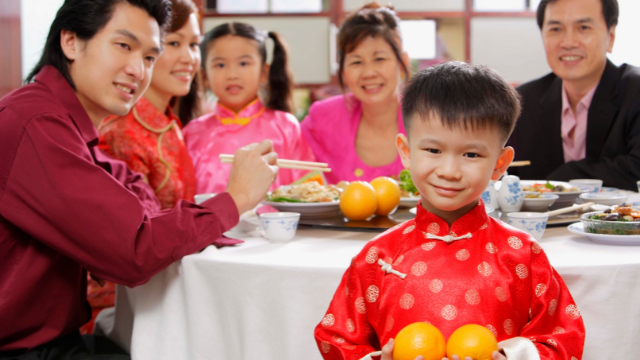
The family stays up through the night to watch fireworks which will scare away demons and bad luck. Households are brightly lit and fragrant with incense. This incense is burned to welcome the return of the gods that left heaven at the end of the previous year. Gifts such as paper money, tinfoil shapes, and fruit are prepared for New Year’s Day.
10 Interesting Facts about the Lunar New Year – Spring Festival
1. Sunday, January 22, 2023, starts the Lunar year 4721.
When is the Lunar New Year? The date for Chinese New Year changes each year as it is tied to the Chinese lunar calendar. The first day of Chinese New Year falls on the second new moon after the winter solstice, typically ranging between January 21st and February 20.
Spring Festival ends 15 days later on the first full moon of the new lunar year with a celebration known as the Lantern Festival.
2. 2023 is the Year of the Rabbit
It’s believed that people born in a given year will have the personality traits of that year’s animal. Rabbits are known for their elegance and good manners; they are refined and sensitive and have a keen sense of beauty. They are also known to be peaceful, kind, and gentle. They are also believed to be lucky in love and money.
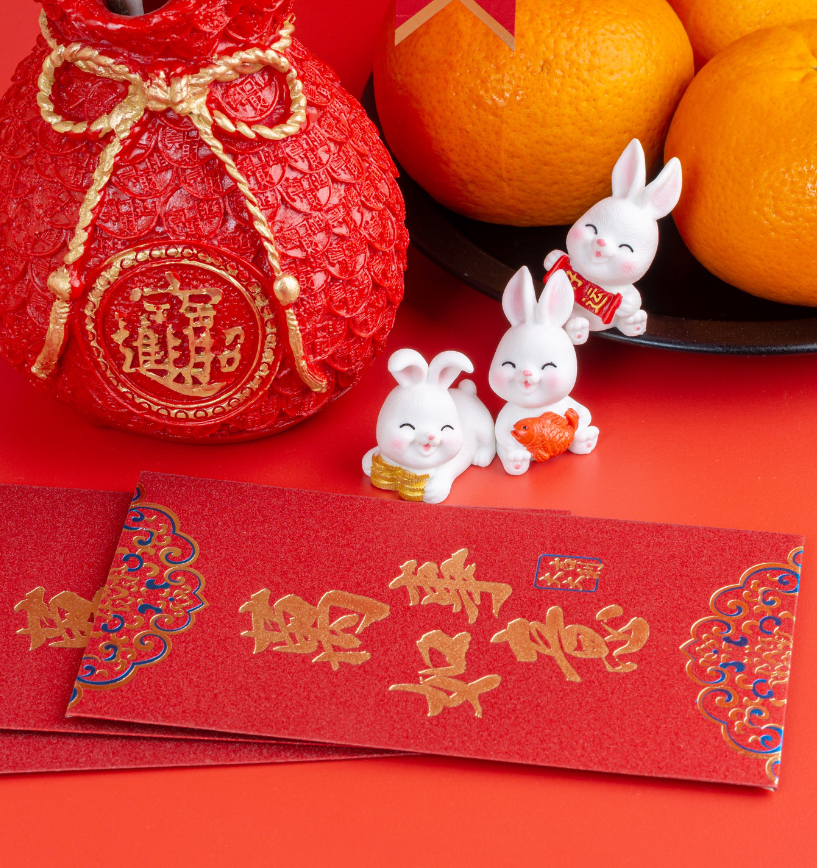
Was I Born in the Year of the Rabbit?
If you were born in 1939, 1951, 1963, 1975, 1987, 1999, 2011, or 2023, you are a Rabbit. According to Chinese astrology, your zodiac sign year is considered to be a lucky year for you. To make the most of this year, Rabbits are encouraged to wear something red or pink, such as red socks, underwear, or jewelry.
Famous People Born in the Year of the Rabbit
Some famous people born in the Year of the Rabbit include Albert Einstein, Michael Jordan, Whitney Houston, Blake Lively, Brad Pitt, Kate Winslet, David Beckham, Angelina Jolie, Frank Sinatra, Quentin Tarantino, and Tiger Woods.
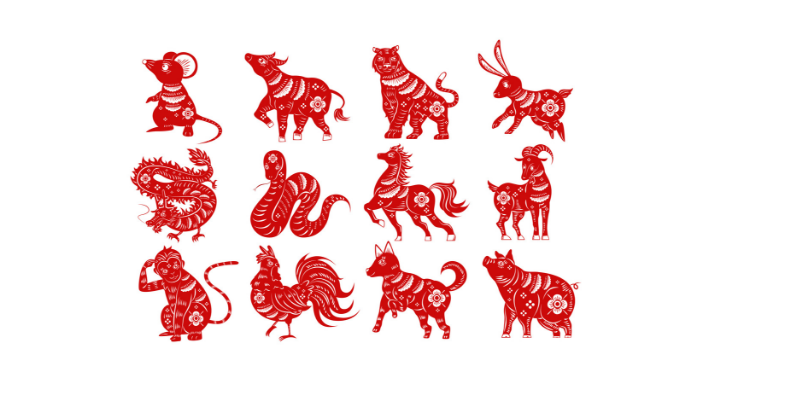
3. Spring Migration, or Chunyun, is the world’s largest annual human migration.
As with Americans who return home each year for Thanksgiving dinner, the most important tradition of the Spring Festival is the family reunion. Nearly everyone tries to spend New Year’s Eve dinner with their parents. Most working-age Chinese live in the cities while their parents often still live in rural villages, leading to a mass migration of epic proportions. Chinese make nearly 3 billion trips by train, plane, boat, car, and bus during the Spring Festival.
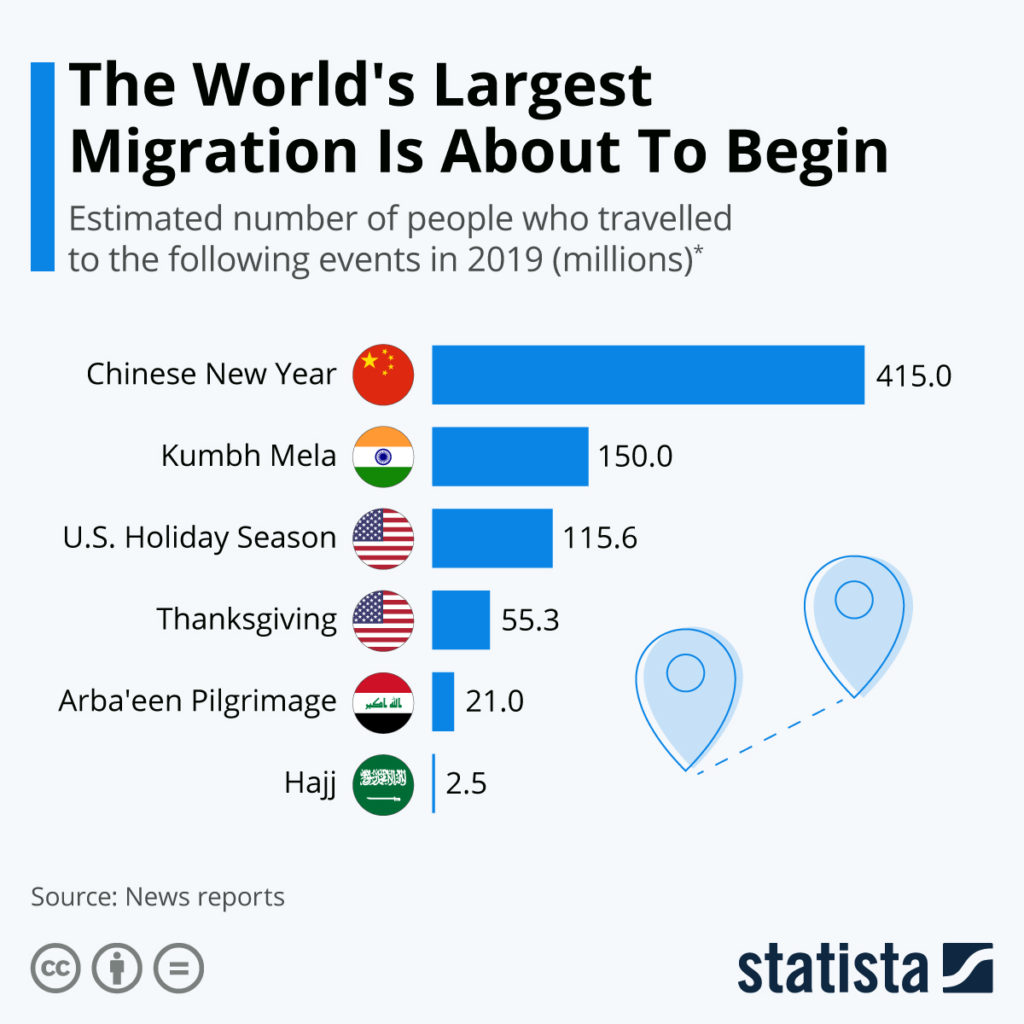
4. Everyone Turns One Year Older on New Year’s Day
According to the traditional Chinese system of age counting, or xūsuì (虚岁), a person’s age is calculated by the number of lunar years or portions of years they have been alive.
For instance, a baby born in November 2020 would turn 4 on Chinese New Year’s Day 2023 because it would have been alive during four lunar years…the Years of the Rat (2020), Ox (2021), Tiger (2022), and Rabbit (2023).
5. How to Say “Happy New Year” in Mandarin Chinese
xīn nián kuài lè (新年快乐) – Happy New Year!
chūn jiē kuài lè (春节快乐) – Happy Spring Festival! –
gōng xǐ fā cái (恭喜发财) – Wishing you to be prosperous in the coming year.
gong hei fat choy (恭喜发财) – Wishing you great happiness and prosperity (in Cantonese)
xīn xiǎng shì chéng (心想事成) – May all your wishes come true.
Want to get the pronunciation right? Try a Free Pimsleur Mandarin lesson!
Check out this video for more New Year’s Greetings…
6. Children Receive Lucky Money in Red Envelopes
The Spring Festival tradition of gifting lucky money contained in red envelopes, also known as red pockets, red packets, or hong bao, is believed to bestow blessings and transfer fortune from elders to children. These days it is also common to exchange red envelopes between bosses and employees and even between colleagues and friends.
Hong bao must be in new bills, and the total amount must be even. The unlucky number “four” is a homonym for “death,” so a red envelope should never contain an amount that includes a four in it.
As a sign of the times, digital red pockets are now on trend. People send virtual hong bao to groups of their friends and families via apps on WeChat and then watch everyone scramble to win the packets by being the first to click them on their smartphones. This is called Qiang Hong Bao, which means “snatching the money of Hong Bao.”
7. Cleaning and Showering are Not Allowed on Chinese New Year
Before the Spring Festival, a day is set aside to thoroughly clean your home, sweeping away ill luck and allowing good fortune to enter. However, once this New Year’s good fortune has entered, you should not shower, wash clothes, sweep, or toss away garbage for fear of washing or throwing your good luck away. Other things that are taboo during the Spring Festival include swearing, arguing, using scissors and knives, cutting your hair, and saying unlucky words such as “sickness” and “death.”
8. Why do the Chinese Decorate in Red and Set off Fireworks for Chinese New Year?
According to legend, the demon monster Nian, (also the Chinese word for ‘year’) would come out from its hiding place at the end of the long winter to terrorize villagers and eat their children and livestock.
While most people cowered in their homes, one old man decided to battle Nian. Knowing that the monster was afraid of loud noises and the color red, the brave man dressed all in red and set off firecrackers throughout the night. Nian left the village.
Every spring thereafter, the villagers would dress in red, decorate their homes with red lanterns, banners, and paper cuttings, and light fireworks to scare off monsters and bad luck. Today, China produces 90% of the world’s fireworks.
Watch Nian’s story below:
9. More than 2 Billion People Celebrate Spring Festival or Lunar New Year
With almost 1/4th of the world’s population taking part, Spring Festival is the most celebrated holiday in the world.
The countries in which Spring Festival or Chinese New Year is an official public holiday include Mainland China, Hong Kong, Macau, Indonesia, The Philippines, Vietnam, South Korea, Malaysia, North Korea, Taiwan, Singapore, and Brunei. There are also significant celebrations in cities such as San Francisco, New York, Vancouver, London, and Sydney.
10. Rent-a-Date to Meet Your Parents
Deeply held Confucian ideals and traditions surrounding marriage and the continuation of bloodlines lead Chinese parents to exert enormous pressure on their twenty-somethings to marry young and produce grandchildren. In fact, career women over 27 are considered ‘leftover girls’ or sheng nu.
This leads to great family anxiety at the New Year’s reunion. An increasingly popular way for young singles to temporarily avoid parents’ nagging and pressure is by renting a boyfriend or girlfriend online. For approximately $100/day you can rent a date for your family festivities. There are several dating/rental apps with hundreds of ‘rental lover’ ads to choose from.
Learn Mandarin and Join the Celebration!
Our science-based Pimsleur Method and on-the-go software allow you to learn your dream language from anywhere – at the airport, out on a jog, or while you’re stuck in traffic!
Check out our Mandarin language subscription and get started today!
Try the Full Pimsleur Chinese (Mandarin) Premium Course for 7 days Free!
Only $19.95/month thereafter.
No Comments for "Lunar New Year 2023 – Year of the Rabbit"